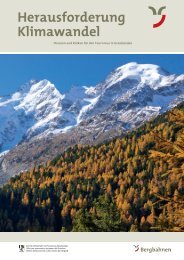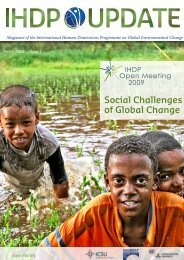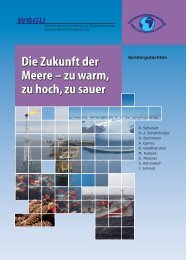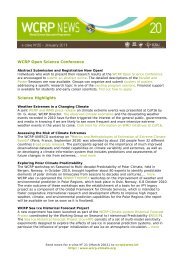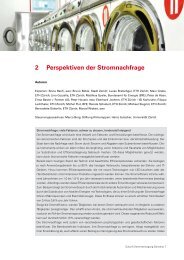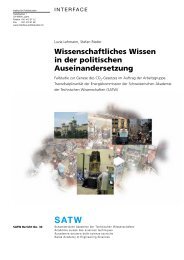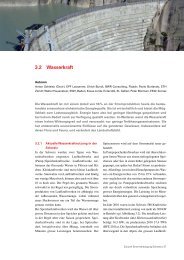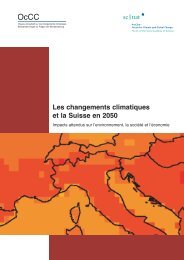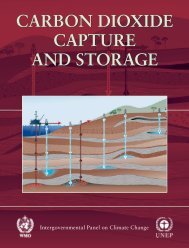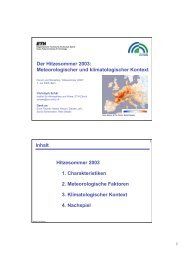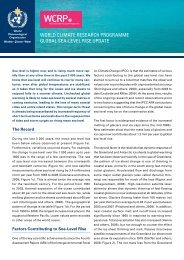Climate Change and Switzerland 2050 - OcCC - SCNAT
Climate Change and Switzerland 2050 - OcCC - SCNAT
Climate Change and Switzerland 2050 - OcCC - SCNAT
You also want an ePaper? Increase the reach of your titles
YUMPU automatically turns print PDFs into web optimized ePapers that Google loves.
<strong>Climate</strong> <strong>Change</strong> <strong>and</strong> Switzerl<strong>and</strong> <strong>2050</strong> | Water management 59<br />
Micro- <strong>and</strong> small organisms<br />
Water temperatures in the surface layer of lakes have increased in winter in the past decades,<br />
which has resulted in an increase in the thermal stability <strong>and</strong> a change in circulation conditions.<br />
This has resulted in temporal shifts in the food chain <strong>and</strong>, in lakes with sufficient oxygen<br />
content, in a decrease in phytoplankton diversity. As a consequence of future warming, living<br />
conditions in lakes with currently sufficient oxygen content may deteriorate. 2<br />
Today’s state of knowledge does not allow comprehensive<br />
predictions to be made about the changes<br />
in aquatic biodiversity by <strong>2050</strong>. Adaptability <strong>and</strong><br />
adaptation speed are species-specific <strong>and</strong> cannot<br />
be predicted. However, single changes can be<br />
qualitatively foreseen.<br />
In lakes, the food chain will undergo a temporal<br />
shift due to the warming. In spring, the feeding<br />
pressure of zooplankton ends algal bloom. What<br />
follows is the so-called “clear-water” phase. Since<br />
the growth <strong>and</strong> feeding rates of zooplankton<br />
are higher with warmer than with cooler water<br />
temperatures, the clear-water phase occurs earlier<br />
after warm than cold winters. In the past 20<br />
years, the clear-water phase has been observed<br />
Fish<br />
to occur about two weeks earlier. According to<br />
the climate scenario, the clear-water phase will<br />
continue to occur earlier in the future, although,<br />
this is not possible indefinitely.<br />
Since the seventies, winter phosphate concentrations<br />
have decreased due to cost-intensive<br />
measures (wastewater treatment, closed circular<br />
pipeline). At the same time, an increase in phytoplankton<br />
diversity has been observed. In the<br />
past decades, warm winter temperatures have<br />
had a negative effect on phytoplankton diversity<br />
in lakes with sufficient oxygen content. This<br />
development will probably continue with future<br />
warming. In lakes without sufficient oxygen content,<br />
the influence is not clear.<br />
The warming of waterbodies affects cold water fish; their suitable habitats are reduced<br />
<strong>and</strong> species composition changes. Cold <strong>and</strong> warm water fish will profit from the warmer<br />
winters.<br />
For fish, human interference in the hydrology<br />
<strong>and</strong> morphology of waterbodies were important<br />
influencing factors in the past. This will also be<br />
the case in the future.<br />
As a result of the warming in Swiss streams<br />
by 0.4–1.6 °C in the past 25 years (fig. 1), trout<br />
habitat has shifted upwards by 100–200 m. 3<br />
A similar development was observed in North<br />
America: In the Rocky Mountains, the habitat<br />
suitability for trout decreased by 17% with a<br />
warming of the water by 1 °C in July. 5<br />
Estimates have shown that with a warming of 2 °C<br />
by <strong>2050</strong>, the habitats of salmon in Switzerl<strong>and</strong><br />
will shrink by 1 / 5 to 1 / 4 compared to today. Cold<br />
water as well as warm water fish will profit from<br />
warmer winter temperatures; growth phases last<br />
longer <strong>and</strong> the fish grow more quickly. As a<br />
result, waterbodies will become more suitable for<br />
carp (Cyprinidae) <strong>and</strong> exotic fish species.<br />
Illnesses like the parasite infection PKD<br />
(Proliferative Kidney Disease) will spread with<br />
warmer water temperatures. 6



